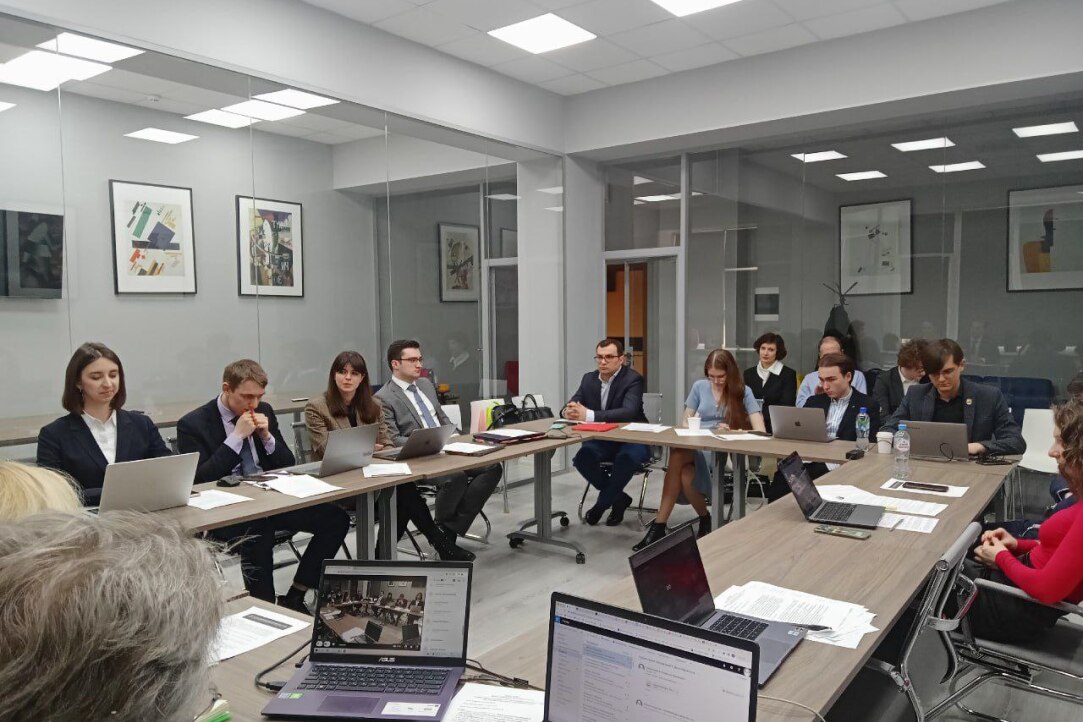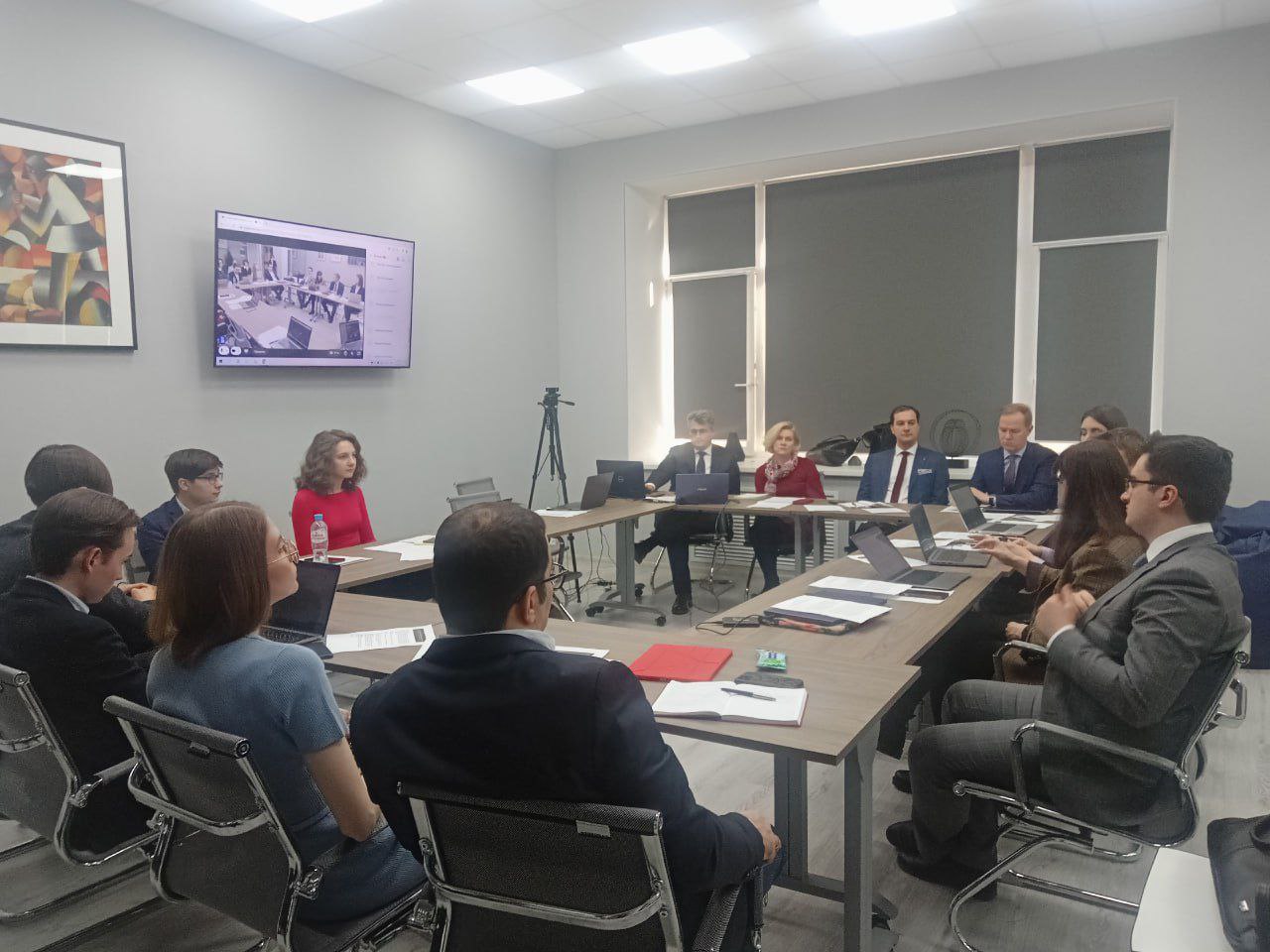How and where to challenge sanctions?
On April 7, Round Table on the topic “Protection of the rights and legitimate interests of sanctioned Russian individuals in international courts” was held at the Faculty of Law of the Higher School of Economics. The event was organized by the Faculty of Law of the Higher School of Economics.

-
The round table was attended by:
THE REPRESENTATIVES OF THE HSE’S DEPARTMENT OF INTERNATIONAL LAW
JUDGE OF THE EUROPEAN COURT OF HUMAN RIGHTS (RETIRED) DMITRY DEDOV
LEGAL PRACTITIONERS (IN PARTICULAR, PARTNERS OF THE LAW FIRM NEKTOROV, SEVELIEV & PARTNERS SERGEY GLANDIN AND ILIA RACHKOV, MANAGING PARTNER OF THE LAW FIRM OF LINNIKOV & PARTNERS ALEKSANDR LINNIKOV, AND OTHERS)
POSTGRADUATE STUDENTS, STUDENTS OF MASTER’S AND BACHELOR’S DEGREE STUDIES IN HSE, MOSCOW STATE UNIVERSITY NAMED AFTER M. V LOMONOSOV, OTHER UNIVERSITIES
Within the conference, the participants reviewed recent landmark decisions on sanctions and discussed their impact on the international legal order. Special emphasis was placed on emerging international jurisprudence, and opportunities to challenge unilateral economic sanctions.
Doctor of legal sciences, Professor Vera Rusinova in her welcoming remarks emphasized the timeliness and relevance of the held event. The need for an analysis of existing jurisprudence and its peculiarities was noted as well. The use of economic sanctions by Western states increased dramatically in 2022, which led to many contentious issues and discussions on the legality of their application. The necessity of the application of a wide range of analytical tools for analyzing the legal implications of the imposition of sanctions was emphasized, in particular, from the perspective of international investment law, WTO rules, human rights, etc.
The round table was moderated by Vladislav Starzhenetskiy, Associate Professor, PhD in Law, Head of the HSE Laboratory of International Justice, and Sergey Glandin, attorney-at-law, partner of NSP, PhD in law.
A series of scientific reports opened by Ilia Rachkov, partner of the NSP, MGIMO associate professor, PhD in law. In the presentation named “International investment arbitration as a solution in the Case of the National Settlement Depository” the speaker highlighted the main issues of legal protection in connection with the freezing of assets of Russian investors in the European depository Euroclear through international investment arbitration. In addition, other ways for protection of investors’ rights under international law were also considered.
The event was followed by Sergey Glandin, partner of the NSP, PhD in law. In his presentation “When family ties cannot be sanctioned” the speaker reviewed the recent decision of the European Court of Justice on Violette Prigozhina, according to which inclusion of the Russian citizen into the EU sanctions list was found unlawful. The Court found that there was a lack of the necessary and sufficient evidence for inclusion in sanctions list. The presentation also addressed the negative practice of adding relatives of individuals into the sanctions lists. Successful cases of challenges of the imposed sanctions have been also reviewed.
Trainee of the HSE Laboratory of International Justice Proyavka Polina in her presentation reviewed the judgment of the International Court of Justice from 30.03.2023, in which the principal organ of international justice of the UN considered the application of the US unilateral economic sanctions against Iran. The International Court of Justice ruled in favour of Iran and disregarded the unreasonable and discriminatory measures taken by the USA in relation to Iran’s companies, in violation of the Treaty of Amity 1955, concluded between the Parties.
The presentation of Elena Murashko, a Postgraduate student of the HSE Faculty of Law, was focused on the potential violations of the WTO agreements by the imposition of unilateral economic sanctions. Special attention was given to the application of “security exceptions”, in accordance with which the States may deviate from their international legal obligations. The current practices and approaches of the WTO dispute settlement body were reviewed.
Ilona Khintsagova, a student of the Bachelor's program of the Law Faculty of Moscow State University named after M.V.Lomonosov, in her presentation “Interim measures of protection granted by the ECJ based on the ECJ’s determination in the case Mazepin T‑743/22 R” analyzed the case of Nikita Mazepin, in which for the first time in history if the ECJ, the applicant has been granted the interim measures of protection in the form of partial suspension of the restrictions until the decision on the merits.
Anastasiya Kosyakina, a student of the Master’s degree program of Law of Moscow State University named after M.V.Lomonosov, in her report «Holding the EU institutions to non-contractual liability for the wrongful imposition of the sanctions» commented on the ECJ practice on the compensation of former EU sanctions list holders, successful examples of EU authorities being held accountable for violations of private rights.
Artem Kasumyan, a student of the Master’s degree program of Law of Moscow State University named after M.V.Lomonosov, in his presentation “Lessons from the ECJ Grand Chamber on the case RT France v Council T-125/22” reviewed the judgment of the ECJ on the case of RT France v. Council about the imposition of sectoral sanctions against the Russian media and related legal issues, concerning violations of the right to freedom of expression.
Gleb Boyko, a student of the Master’s degree program of Law of Moscow State University named after M.V.Lomonosov, presented his report on “Changing circumstances and distancing as grounds for de-listing from the sanction list on the example of the case Ovsyannikov T-714/20”. A key aspect of this case was the judges' ruling that change in the facts and personal situation of the applicant should lead to the removal of restrictive measures against such an individual.
Victoria Polshakova, a trainee of the HSE Laboratory of International Justice, together with another trainee of the said laboratory Anastasia Santalova examined the key practice of the European Court of Human Rights in challenging restrictive measures due to human rights violations. Examples of specific cases have illustrated how human rights violations can be served as a legal basis for the lifting of sanctions.
At the end of the roundtable discussion student of the Master’s degree program of Law of Moscow State University named after M.V.Lomonosov Afina Ameridi presented her report on “Synesis - the first case in England about the lifting of sanctions through the court”. The Synesis is the first case to be heard under the rules for judicial review of British law on sanctions and which demonstrated the formal approach of English justice.
Presentations by participants were accompanied by intensive discussion, exchange of views, and questions. Discussion of effective means to protect the rights and legitimate interests of sanctioned individuals in international courts will be continued, in particular on the pages of the HSE University Journal of International Law.

